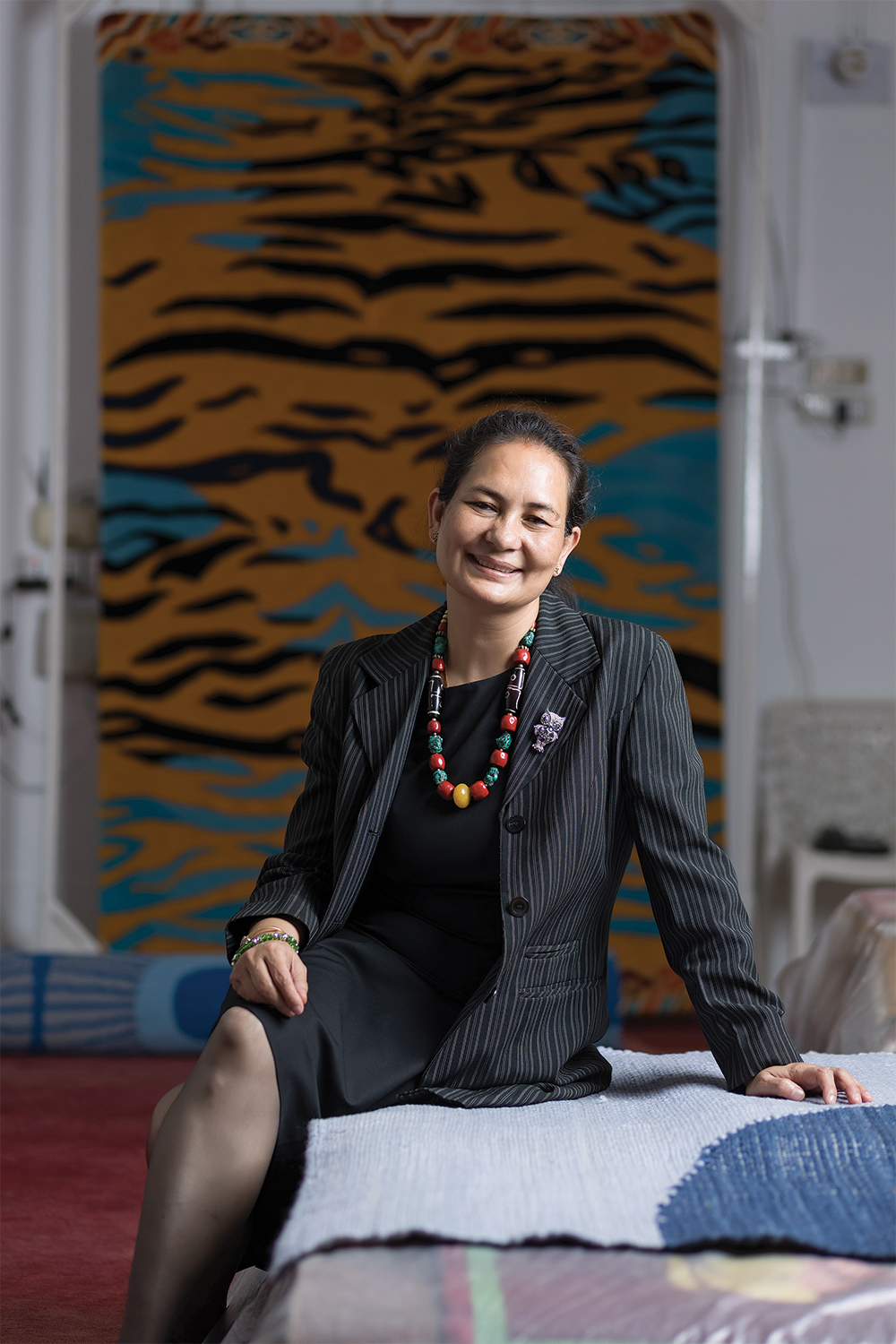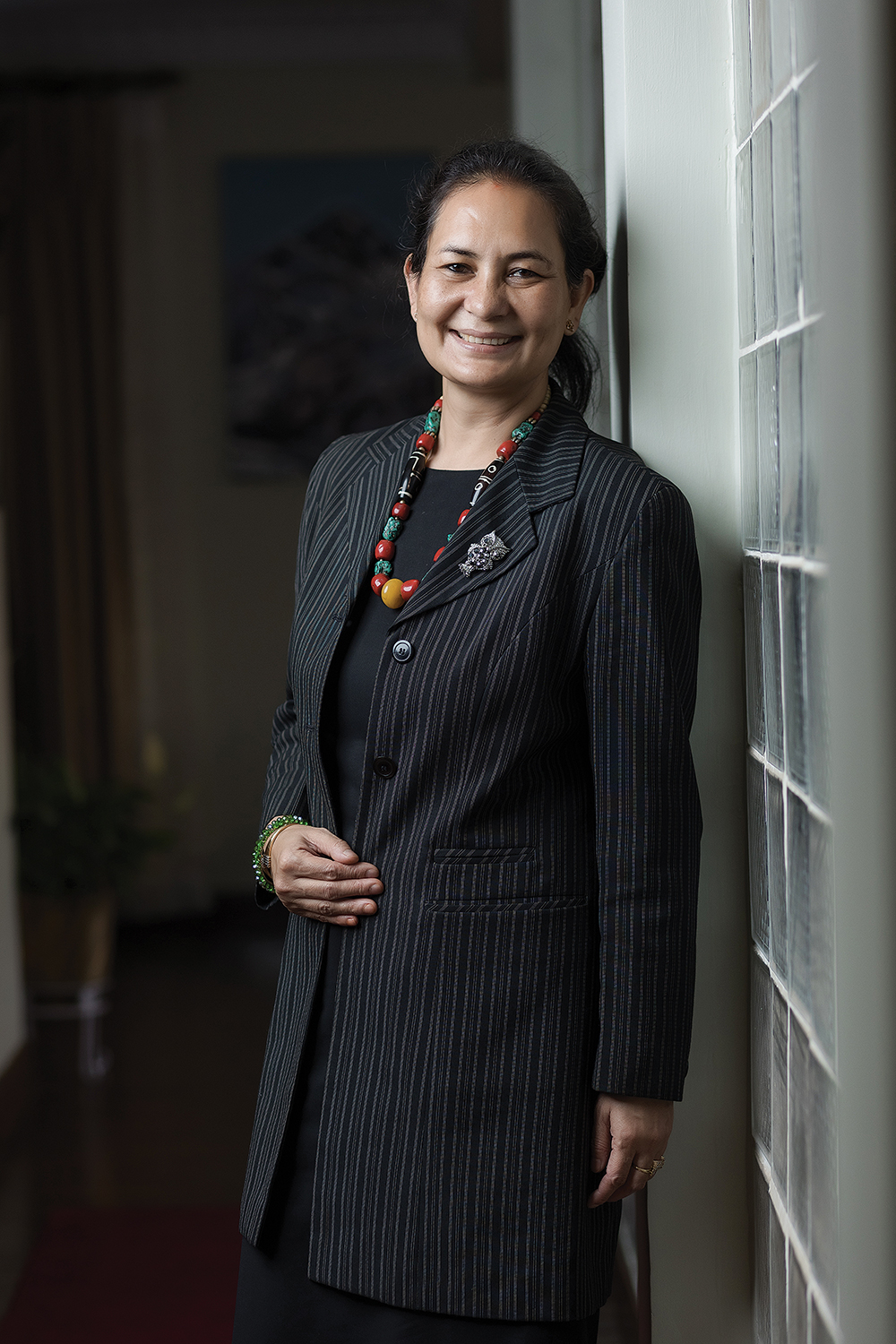
Mishu Shrestha FOUNDER & DESIGNER, MISHUS DIRECTOR, RADISSON HOTEL KATHMANDU
While speaking about her career, Mishu Shrestha, the Founder and Designer of Mishus and Director of Radisson Hotel Kathmandu, is very candid about how she got into business. “My story is a bit different because usually in our society, a woman has to sacrifice her career after she gets married but mine actually started after I tied the knot,” she says. “My father-in-law was very particular that I do not waste time at home and urged me to build a career and an identity for myself,” she elaborates. “And for that, I will forever be indebted to him. He is the inspiration behind what I am today.” Initially, Shrestha joined the family business, Himalayan Wood Craft, but when the family decided to enter the hospitality business, she was intrigued and decided to get involved. “I have been involved with Radisson since the very beginning, from the excavation works to lay the foundation to it completing and today I have been part of it. I am a board of director in the hotel,” she says. “But to be honest my heart is more into Mishus, my fashion design house,” mulls Shrestha. So, what pulled her into the world of fashion and design? After a year of the hotel’s opening, she decided to get back into another vertical of the family business which dealt with carpets and pashmina. “We are one of the pioneer businesses in carpets and pashmina and will soon be completing 50 years,” she says. At the time the market for pashmina was mainly focused on shawls but every other business was doing just that; Shrestha knew it was time for a change. When speaking to her buyers, she discovered that many were also interested in knitwear. “It was a completely new venture for me but again what is life without challenges,” she says. Initially, the buyers would send the designs and she would prepare some samples and on approval, the products were made and shipped to them. “I was still not into fashion design at that stage but as the designs kept coming in, I got fascinated and gradually began to create some of my own,” she recalls; and that perhaps was the beginning of Mishus. The other thing that strongly impelled her to start Mishus was the need to create her own identity, her own brand. She says, “Every time we go to a party or a gathering, we women are more often than not introduced as somebody’s daughter or wife or daughter-in-law. I wanted people to recognise me as an individual. But I didn’t have anything to show as my own. And the more you get into work, you start to crave for that recognition. Why be recognised through someone else’s identity?”
But without any knowledge of the fashion industry, she realised that to actually make a mark she would need to work on herself first. She decided to go to Italy to take a course at the Milan Fashion Campus. On returning, she decided to organise a fashion show but when she talked to her husband about the idea, he told her that an eight-month course in Milan would not suffice. “He actually told me not to assume that I could be a designer in such a short span of time and this sort of hit my ego,” she recalls. To prove her capability, she put together 40 designs within four months and held her first fashion show on November 22, 2012.
When Shrestha held the first show, she says she didn’t know her forte or strategise the success; it was just to prove herself. Two years later, she held her second fashion show, and there has been no looking back since. “Now I know what I am doing and I specialise in cashmere and evening wear,” she states. “If you persist in any work that interests, sooner or later you will reap its benefits”, she reflects talking about how she was invited to participate in the Cannes Film Festival in 2018, which was her first international show.
Just when things had started to look up, the Covid 19 pandemic hit. But Shrestha had honed herself to take on any challenge and turn it into an opportunity. Since masks had become a requirement, she decided to focus on designing masks that would not only fulfil its purpose but also be a fashion statement. “I must thank my brand manager for this initiative because she was the one who guided me through this phase,” she says. When designing the masks, Shrestha shares the two fundamental elements that she kept in mind was to follow the strict health guidelines and use Nepali fabrics. “The reason I utilised dhaka which is an authentic Nepali fabric, was because I also wanted to showcase the beauty of our indigenous materials,” she says, adding, “As a fashion designer we also need to be aware of the locally available raw materials because they add to the originality of our designs. Besides, in a small way, you are also helping generate employment at the grassroots level”.
On receiving approval from international buyers, she started exporting the masks. She recalls the five months when she had no work and the mask manufacturing actually breathed life back into business. “Not only did we have something to work on but I could also employ a few women who manufacture the required fabrics at home. All of our masks are made of native materials,” she states.
From being involved in an established business to starting your own venture, what was the experience like? Shrestha shares, “When you open your own venture you can guide it from day one, which direction you want to take it, what management style you want to adopt, there is a lot you can do. But when you join something that has already been established, there is very little room to manoeuvre even the small things. The beauty of starting one’s own business is like raising a child, at times you need to be flexible and there are times when stern decisions need to be made”, she reflects.
“I was still not into fashion design at that stage but as the designs kept coming in, I got fascinated and gradually began to create some of my own,” she recalls; and that perhaps was the beginning of Mishus. The other thing that strongly impelled her to start Mishus was the need to create her own identity, her own brand. She says, “Every time we go to a party or a gathering, we women are more often than not introduced as somebody’s daughter or wife or daughter-in-law. I wanted people to recognise me as an individual. But I didn’t have anything to show as my own. And the more you get into work, you start to crave for that recognition. Why be recognised through someone else’s identity?”
But without any knowledge of the fashion industry, she realised that to actually make a mark she would need to work on herself first. She decided to go to Italy to take a course at the Milan Fashion Campus. On returning, she decided to organise a fashion show but when she talked to her husband about the idea, he told her that an eight-month course in Milan would not suffice. “He actually told me not to assume that I could be a designer in such a short span of time and this sort of hit my ego,” she recalls. To prove her capability, she put together 40 designs within four months and held her first fashion show on November 22, 2012.
When Shrestha held the first show, she says she didn’t know her forte or strategise the success; it was just to prove herself. Two years later, she held her second fashion show, and there has been no looking back since. “Now I know what I am doing and I specialise in cashmere and evening wear,” she states. “If you persist in any work that interests, sooner or later you will reap its benefits”, she reflects talking about how she was invited to participate in the Cannes Film Festival in 2018, which was her first international show.
Just when things had started to look up, the Covid 19 pandemic hit. But Shrestha had honed herself to take on any challenge and turn it into an opportunity. Since masks had become a requirement, she decided to focus on designing masks that would not only fulfil its purpose but also be a fashion statement. “I must thank my brand manager for this initiative because she was the one who guided me through this phase,” she says. When designing the masks, Shrestha shares the two fundamental elements that she kept in mind was to follow the strict health guidelines and use Nepali fabrics. “The reason I utilised dhaka which is an authentic Nepali fabric, was because I also wanted to showcase the beauty of our indigenous materials,” she says, adding, “As a fashion designer we also need to be aware of the locally available raw materials because they add to the originality of our designs. Besides, in a small way, you are also helping generate employment at the grassroots level”.
On receiving approval from international buyers, she started exporting the masks. She recalls the five months when she had no work and the mask manufacturing actually breathed life back into business. “Not only did we have something to work on but I could also employ a few women who manufacture the required fabrics at home. All of our masks are made of native materials,” she states.
From being involved in an established business to starting your own venture, what was the experience like? Shrestha shares, “When you open your own venture you can guide it from day one, which direction you want to take it, what management style you want to adopt, there is a lot you can do. But when you join something that has already been established, there is very little room to manoeuvre even the small things. The beauty of starting one’s own business is like raising a child, at times you need to be flexible and there are times when stern decisions need to be made”, she reflects.
“When we speak about fashion, it fundamentally means originality, a reflection of your ideas, so it does not matter whether the product is small or big, it has to stand out,”
 What aspect does she love the most from her fashion house. “It is not that I don’t like the work with the other businesses, but I derive an inner satisfaction from Mishus that is incomparable. The other aspect is that its not a 9 to 5 type of work. It’s all about creativity. One never knows when a brilliant idea might strike and you start working on it”, she explains.
While talking about the fashion industry in Nepal, Shrestha shares that it has evolved a lot since the time she started in 2012. She recalls the initial years when fashion shows in the country basically meant showcasing an ensemble of clothes that were readily available in the market. “At present, there are young designers who are very creative and you witness something different in every fashion show,” she says. The only advice she has for beginners is to specialise in one aspect whether it be evening wear or ready-to-wear or just the fabrics they use.
“When we speak about fashion, it fundamentally means originality, a reflection of your ideas, so it does not matter whether the product is small or big, it has to stand out,” she elaborates. “ Shrestha is extremely particular about maintaining the quality of her products because she understands that quality equates to repeat customers, and repeat customers basically mean you can sustain and grow.
“When a designer maintains authenticity and quality, there is no stopping them”, shares Shrestha. She gives her own example about being the first Nepali fashion designer to be invited to do a show at the Cannes Film Festival. “I am also proud that Sabrina Kalbashev, an award winning American-Dutch actress and Katiana Lee, a Slovenian actress, wore my dresses at the Cannes Film Festival this year,” she shares.
“And just recently I have also been invited to the London Fashion Week to be held in September, which is another first for a Nepali designer,” she smiles with a quiet look of accomplishment. For the London Fashion Week, she says she will be showcasing cashmere spring/summer collection for 2023.
While elaborating on being selected for the London Fashion Week, Shrestha mentions that it is definitely a huge opportunity for her personally but the better part is that her participation could open doors for the new generation of Nepali fashion designers. “I will give my best because when I do so, our country will be recognised and the entire domestic fashion industry will get a boost,” she states, adding, “And when the industry starts expanding then it will subsequently help all the players, me included, in expanding our businesses.”
Talking about her accomplishments, she also mentions that the masks she designed for the Nepali Olympic team is on display at the Nepal Olympic Museum. Mishu Shrestha has been published in various national and international magazines with the most recent being in the July edition of the Harper’s Bazaar Vietnam.
From anxious moments when she first launched Mishus to becoming a celebrated brand, Shrestha shares that it is her work ethics and team spirit that have helped her reach this far. “People may recognise my brand and my name but what you need to understand is it would not have been possible alone. There are so many staff working for me from the managerial level to the one who cleans the office, and we make sure that each person is given due respect because without a well-oiled team no person is going to achieve anything in life,” she adds.
“For any person to be successful one has to be willing to burn the midnight lamp. More so if you are a woman because till date no matter what we say, it is still a man’s world,” she says emphatically. “Even when it is a small-scale business, it is very difficult for women entrepreneurs to get funding from banks. But the biggest hurdle a woman faces when starting a venture is usually the family. It is next to impossible if a woman does not receive support from her family. How can one run a business when they are occupied 24/7 with household chores? It is not that Nepali women do not have the skills or the knowledge to open and operate a business, it is just about the lack of opportunities”, she says.
Among the challenges of the fashion business in the country, she says, the most important is the lack of raw materials. “Production of raw materials like yarn and silk is low in Nepal so we have to import these, and imports add to the cost of production which is the main reason why Nepali products lose competitiveness in global markets,” she states.
For young entrepreneurs, Mishu Shrestha that unless you have the passion for what you are doing, not only will you not succeed but you will also be unhappy, which ultimately will start to affect your personal life too. “There is always an incubation period whether it is a job or a startup. You have to give ample time for things to fall into place. For instance, it took many years for people to recognise the name Mishus, it was not an overnight success,” she concludes.
READ ALSO:
What aspect does she love the most from her fashion house. “It is not that I don’t like the work with the other businesses, but I derive an inner satisfaction from Mishus that is incomparable. The other aspect is that its not a 9 to 5 type of work. It’s all about creativity. One never knows when a brilliant idea might strike and you start working on it”, she explains.
While talking about the fashion industry in Nepal, Shrestha shares that it has evolved a lot since the time she started in 2012. She recalls the initial years when fashion shows in the country basically meant showcasing an ensemble of clothes that were readily available in the market. “At present, there are young designers who are very creative and you witness something different in every fashion show,” she says. The only advice she has for beginners is to specialise in one aspect whether it be evening wear or ready-to-wear or just the fabrics they use.
“When we speak about fashion, it fundamentally means originality, a reflection of your ideas, so it does not matter whether the product is small or big, it has to stand out,” she elaborates. “ Shrestha is extremely particular about maintaining the quality of her products because she understands that quality equates to repeat customers, and repeat customers basically mean you can sustain and grow.
“When a designer maintains authenticity and quality, there is no stopping them”, shares Shrestha. She gives her own example about being the first Nepali fashion designer to be invited to do a show at the Cannes Film Festival. “I am also proud that Sabrina Kalbashev, an award winning American-Dutch actress and Katiana Lee, a Slovenian actress, wore my dresses at the Cannes Film Festival this year,” she shares.
“And just recently I have also been invited to the London Fashion Week to be held in September, which is another first for a Nepali designer,” she smiles with a quiet look of accomplishment. For the London Fashion Week, she says she will be showcasing cashmere spring/summer collection for 2023.
While elaborating on being selected for the London Fashion Week, Shrestha mentions that it is definitely a huge opportunity for her personally but the better part is that her participation could open doors for the new generation of Nepali fashion designers. “I will give my best because when I do so, our country will be recognised and the entire domestic fashion industry will get a boost,” she states, adding, “And when the industry starts expanding then it will subsequently help all the players, me included, in expanding our businesses.”
Talking about her accomplishments, she also mentions that the masks she designed for the Nepali Olympic team is on display at the Nepal Olympic Museum. Mishu Shrestha has been published in various national and international magazines with the most recent being in the July edition of the Harper’s Bazaar Vietnam.
From anxious moments when she first launched Mishus to becoming a celebrated brand, Shrestha shares that it is her work ethics and team spirit that have helped her reach this far. “People may recognise my brand and my name but what you need to understand is it would not have been possible alone. There are so many staff working for me from the managerial level to the one who cleans the office, and we make sure that each person is given due respect because without a well-oiled team no person is going to achieve anything in life,” she adds.
“For any person to be successful one has to be willing to burn the midnight lamp. More so if you are a woman because till date no matter what we say, it is still a man’s world,” she says emphatically. “Even when it is a small-scale business, it is very difficult for women entrepreneurs to get funding from banks. But the biggest hurdle a woman faces when starting a venture is usually the family. It is next to impossible if a woman does not receive support from her family. How can one run a business when they are occupied 24/7 with household chores? It is not that Nepali women do not have the skills or the knowledge to open and operate a business, it is just about the lack of opportunities”, she says.
Among the challenges of the fashion business in the country, she says, the most important is the lack of raw materials. “Production of raw materials like yarn and silk is low in Nepal so we have to import these, and imports add to the cost of production which is the main reason why Nepali products lose competitiveness in global markets,” she states.
For young entrepreneurs, Mishu Shrestha that unless you have the passion for what you are doing, not only will you not succeed but you will also be unhappy, which ultimately will start to affect your personal life too. “There is always an incubation period whether it is a job or a startup. You have to give ample time for things to fall into place. For instance, it took many years for people to recognise the name Mishus, it was not an overnight success,” she concludes.
READ ALSO:
Published Date: August 25, 2022, 12:00 am
Post Comments
E-Magazine
RELATED In the Lead



-1767340083.jpg)
